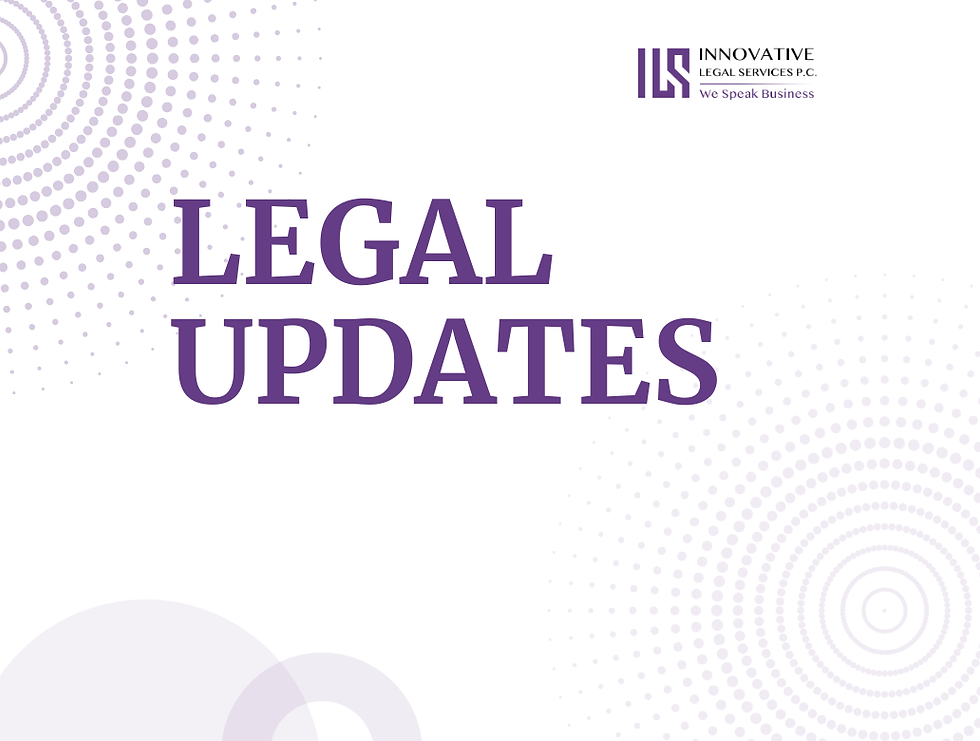Conducting Better Remote Investigation in a Post-Pandemic World
- Lynn Lee

- Jun 12, 2023
- 4 min read
- Richard Liu, Esq. (Managing Counsel)
During this pandemic, technology has allowed us to work remotely and more productively. As a result, companies are now increasingly relying on remote (non-face-to-face) investigations, as they allow quicker scheduling of the individuals involved; are easier to manage, especially when individuals reside in different states and/or time zones; and reduce the amount of time, costs, and resources needed to complete the investigation.

In this article, we will address a few common pitfalls and provide you with five tips to up your remote investigation game.
1. Understand Privacy Laws
Don’t overlook privacy, as employers have a legal obligation to protect employee information. Before conducting the remote investigation, employers should understand the applicable privacy laws, as well as other relevant statutes such as the Health Insurance Portability and Accountability Act (HIPAA) and the Genetic Information Nondiscrimination Act (GINA). Failure to comply with relevant privacy statutes can lead to fines and penalties for employers. For example, penalties for “willful neglect” violations under HIPAA can cost up to $50,000 per violation. Mishandling employee information also can subject the employer to civil penalties and attorney fees.

2. Maintain Data Security
Data security is another important consideration in remote investigations. Remote investigators should avoid using consumer shared drives to share sensitive documents and information. Instead, they should use a secure data sharing platform, which should include end-to-end encryption to prevent third parties from accessing shared data. In addition, investigators should be aware of and follow appropriate data preservation and storage protocols in the company.
To keep investigative records confidential, consider implementing these steps:
When sharing data and evidence by email or other online tools, ensure platforms and systems used are secure and can be accessed only by the relevant parties involved in the investigation.
Organize relevant documents prior to speaking to witnesses. Make sure all documents are accurately marked and numbered in case they are out of order, and any necessary redactions have been made.
Limit access to investigative documents. Parties involved in the investigation should only have access to information that is specifically relevant to them.
3. Know Your Remote Platform
No matter what platform you use (i.e. WebEx, Zoom, Skype, Google Team), it is important to do the following prior to the investigation meeting:
Be the only host of the meeting to maintain control of the videoconferencing features.
Set a password for the meeting, ensure only relevant parties receive an invitation to the meeting.
Advise the witness up front that you do not consent to allowing the witness to record the interview, explain that recording is not allowed unless expressly agreed by the parties, and a covert recording may be a misconduct matter warranting a disciplinary action.
Request the interviewee to call from a private and quiet location.
Confirm with the interviewee prior to the call that they will have videoconferencing capability during the interview. Request the interviewee to turn on the video feature at the outset of the meeting.
Avoid conducting investigative interviews using public wifi system.
Avoid using personal devices and email accounts to send, receive, or store relevant information.
4. Prepare Investigation Report and Follow Up
Generally, all remote investigation reports should include an outline of the investigation, a list of witnesses interviewed, a registry of the documents collected and reviewed, a summary of the background information, and investigation findings. When the report is complete, it should be reviewed by in-house/outside counsel and sent securely with restrictions on printing and onward circulation.
It is especially important for employers to be mindful of the wellbeing and the mental health of those interviewed. Parties involved are already significantly impacted by the challenges of working remotely and the uncertainty of the current pandemic. An investigation is likely to add to this stress and negatively impact the mental health of the people involved. Therefore, it is essential for employers to ensure parties are supported adequately. Follow up with the interviewees if necessary.
5. Find the Right Investigator
Perhaps the most important aspect of a remote investigation is to find the right investigator, or determine whether it will be handled internally or by a unbiased third-party. If handled internally, the individual should be familiar with the company's videoconferencing tools and have the ability to quickly resolve unexpected technical issues, as breaking up an interview may alter the investigation result. As discussed above, the investigator should also understand the relevant privacy laws, recording laws, and the know-how of maintaining data security throughout the investigation.
It takes years of experience to become an expert at workplace investigations. Every case is different, and each one presents its own legal and practical challenges. Our employment team at Innovative Legal Services is experienced in conducting remote investigations and are available to assist you should the need arise.

Richard Liu, Esq. is the Managing Counsel of ILS. He serves clients as a management-side defense lawyer specializing in employment law. Richard regularly advises Fortune 500 companies and startups on employment, labor, and commercial matters, especially in the defense of wrongful termination, workplace harassment, employment discrimination, internal investigation, wage-hour claims, and trade secret misappropriation.
Email: richard.liu@consultils.com | Phone: 626-344-8949
*Disclaimer: This article does not constitute legal opinion and does not create any attorney-client relationship.


Comments